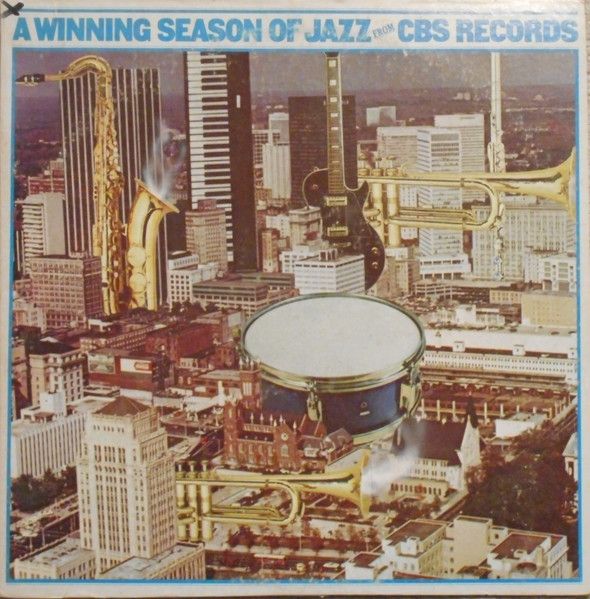
Columbia used the phrase "A winning season of jazz" in some of their late 1970s advertising materials, reflecting the label's commercial and critical success.
(Note: jazz producer Michael Cuscuna passed away in 2024)
In the mid-to-latter years of the 1970s a major American record label was home to an impressive and wide-ranging array of jazz artists such as Dexter Gordon, Weather Report, Woody Shaw, Herbie Hancock, and others who brought the label both critical and commercial success. In the next hour I’ll feature their music, and we’ll also hear from jazz producer Michael Cuscuna, who helmed the records made by Gordon and Shaw and who was close friends with Bruce Lundvall, the Columbia executive who helped shape this notable roster of musicians. It’s “A Winning Season Of Jazz: Bruce Lundvall And Columbia Records In The Late 1970s”… coming up on this edition of Night Lights.
(Saxophonist Dexter Gordon performing “In Case You Haven’t Heard,” from the live 1977 Columbia double-LP Homecoming--a record that helped relaunch Gordon’s career and became a flagship success for the Columbia label’s thriving roster of jazz artists.)
It was the late 1970s, and jazz was in a state of flux—having enjoyed some commercial popularity in recent times through so-called fusion bands such as Weather Report and Return to Forever that embraced electronic instrumentation and broad palettes of musical influence, as well as artists such as Chuck Mangione and Maynard Ferguson who scored top 40 hits with material that was more pop-oriented. Acoustic-based musicians who played in older modes that preceded the rock era continued to perform and record, but they had been receding from the media spotlight since the mid-1960s. Jazz producer Michael Cuscuna, who recorded jazz artists in the 1970s ranging from veteran bop saxophonist Dexter Gordon to avant-garde icon Anthony Braxton, says there were three primary lanes for jazz in the 1970s: loft, fusion, and straightahead.
Columbia Record was a major record label that both reflected the times and found success with a large roster of jazz artists. Jazz had long played an important role at Columbia, which included significant contributions from Billie Holiday, Dave Brubeck, Miles Davis, and Louis Armstrong in its discographical legacy; in 1956 producer George Avakian penned an article for DownBeat Magazine titled, “The History of Columbia is the Saga of Jazz.” By the early-to-mid 1970s, however, jazz had waned somewhat at Columbia. In a single day the label infamously ddropped four jazz Hall of Famers—Ornette Coleman, Bill Evans, Keith Jarrett, and Charles Mingus. Michael Cuscuna says even legendary Columbia producer John Hammond, who had discovered and championed notable jazz and rock musicians ranging from Count Basie to Bruce Springsteen, wasn’t able to do much at a time when rock and soul dominated the music industry.
Jazz's fortunes at the label revived, however, with the ascension of Bruce Lundvall. Lundvall had started at Columbia in an entry-level position in 1961, and he was a part of a clique of jazz-loving-and-playing Columbia executives who sometimes held jam sessions on the label’s 12th floor. Following some turmoil and turnover at the end of Clive Davis’ reign at Columbia, Lundvall became president of CBS Records. Under his leadership Columbia’s jazz program began a renaissance, led by the 1977 release of saxophonist Dexter Gordon’s double album Homecoming, which garnered notable sales and reviews, and is now seen as a harbinger of an acoustic jazz revival that grew into and throughout the 1980s. In 1977 DownBeat ran a story with the headline “Columbia Jazz Assault,” trumpeting the label’s ambitious slate of new and historical releases.
The label blew its own horn in the same era with an advertising insert in some of its LPs heralding what it called “A Winning Season of Jazz.” And the head of Columbia Records was always ready to talk jazz, even when corporate bigwigs such as David Geffen were vying for his attention. Novel as this was, Cuscuna says Columbia’s jazz program still benefitted from the label’s ongoing mainstream rock success that "helped to pay the bills."
Lundvall was also not a monolith, and Columbia’s jazz division was diverse in its representation of jazz styles. One of the label's biggest jazz acts was Weather Report, a fusion band co-led by keyboardist Joe Zawinul and saxophonist Wayne Shorter that found both critical and commercial success throughout the 1970s. Trumpeter Maynard Ferguson stormed the charts in 1977 with his rendition of "Gonna Fly Now," the theme from the Cinderall box-office blockbuster Rocky. Lundvall also brought a young avant-garde artist, saxophonist Arthur Blythe, on board.
All of Columbia’s late 1970s success was happening while their premier jazz artist was off the scene. From 1945 to 1975 trumpeter Miles Davis had played a leading role in shaping the evolution of jazz through bebop, hard bop, modal jazz, and fusion… and for 20 years of that stretch he’d been recording for Columbia. But hobbled by ill health, he had stopped performing and recording, and would not return until the beginning of the 1980s. Michael Cuscuna says that Davis continued to influence the scene even while he was off it.
The group VSOP was one unexpected way in which Davis' influence continued during his sabbatical. Led by pianist and Columbia recording artist Herbie Hancock, who’d put together his own impressive run of albums for the label in the early and mid-1970s that reflected the funk and electric influences of the era, VSOP was the renowned Miles Davis acoustic quintet of the 1960s reconstituted, with trumpeter Freddie Hubbard taking the place of Davis. The group landed on the cover of Newsweek in 1977 with the headline, “Jazz Comes Back!” In addition to his VSOP tour of duty, Hubbard was a late-1970s Columbia recording artist whose discography for the label includes artistic triumphs such as Super Blue and more commercial outings such as Liquid Love that provoked scorn in some jazz corners.
I’m featuring jazz from the late 1970s that was recorded for Columbia Records on this edition of Night Lights, and talking with record producer Michael Cuscuna, who worked closely with Columbia president Bruce Lundvall in those years and who helmed saxophonist Dexter Gordon and trumpeter Woody Shaw’s recordings for the label. It was an exciting and successful time for Columbia’s jazz program, aided by Lundvall’s long-running passion for jazz and a roster of jazz artists that included Weather Report, Stan Getz, Herbie Hancock, Maynard Ferguson, Freddie Hubbard, and many others. Some Columbia musicians such as George Duke and Bob James also worked as executives for the label. Lundvall gave them the freedom to sign, record and champion their favorite artists. For Michael Cuscuna, Woody Shaw was a special cause, leading to a slate of top-notch studio albums and a kinetic live date that Cuscuna counts among his all-time favorites.
In addition to letting his producers run with their artistic desires, Bruce Lundvall also put together packages of artists to showcase the label’s jazz prowess. The CBS All-Stars were a jazz supergroup of label artists such as Stan Getz, Bob James, Hubert Laws, Dexter Gordon and others in various configurations that Columbia recorded in concert at the Montreux Jazz Festival. Inspired in part by his enthusiasm for the Cuban jazz group Irakere, which featured up-and-coming stars such as pianist Chucho Valdes and trumpeter Arturo Sandoval, Lundvall put together an outsized gathering of Columbia jazz musicians and staged a jazz festival in Cuba at the height of the Cold War.
In retrospect Columbia’s late 1970s roster looks like a major-label golden age of jazz. But some expressed disgruntlement at the time about Columbia’s promotion of its jazz artists. In 1979 Peter Keepnews, who had worked at Columbia as a publicist for two and a half years, published an article in Jazz Magazine criticizing the label’s marketing and sales strategy and efforts for its jazz releases. Record sales slumped in 1979, and in 1981 a number of its jazz artists such as Woody Shaw and the Heath Brothers were dropped. Bruce Lundvall left for Elektra Records and would eventually go on to helm the esteemed Blue Note label, while Michael Cuscuna and his colleague Charlie Lourie started Mosaic Records, which would release more than 200 box sets of historical jazz over the next 40 years. Columbia executive George Butler (subject of a future Night Lights program) took Columbia's jazz program in a more youthful direction with the signing of Wynton and Branford Marsalis, Harry Connick Jr., and other musicians from the "Young Lions" generation, as some of the 1980s and early 90s up-and-comers came to be called.
Near the end of my interview with Michael Cuscuna, I asked him what his favorite album was from this era of jazz on Columbia Records. He cited Dexter Gordon’s Manhattan Symphonie, and told me how a cherished standard ended up on the album—a story that to me evokes the magic of how jazz flourished on Columbia during Bruce Lundvall’s tenure.
Special thanks to Michael Cuscuna and Jim Sangrey.
Previously on Night Lights:
The Great Columbia Jazz Purge: Coleman, Evans, Jarrett and Mingus









